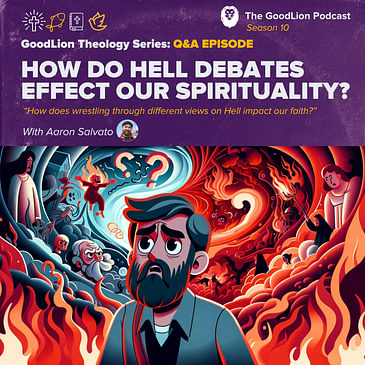🔥 Exploring Hell: The Big Debate
In this Q&A episode of the Good Lion Podcast, we take on one of the most challenging theological topics: hell. With a listener's heartfelt question as our starting point, we delve into how the intense debates around literal vs. metaphorical interpretations affect our faith journey.
🤔 Reconciling God's Love & Justice
How do we reconcile the concept of eternal separation from God's presence with His boundless grace?
Are flames and darkness symbols of something even more troubling than the imagery itself?
We explore how these views shape our understanding of God's love, grace, and His invitation to an abundant life.
📚 Recommendations for the Journey
We recommend a book that thoughtfully engages with these questions (Erasing Hell, By Francis Chan and Preston Sprinkle), offering a compassionate approach to understanding the theological complexities. No matter where we stand, God's grace is an open invitation, urging us toward a life overflowing with love, peace, and the promise of a new heaven and earth.
🌊 Navigating the Waters Together
We offer encouragement and guidance as we navigate these turbulent waters.
The unyielding grace of God calls us to a life rooted in His kingdom and away from separation.
Join us as we seek clarity and hope in the unchanging love of God, always embracing His grace and the joy of journeying together.
You're listening to the Good Lion Podcast!
---
📚 Resources Mentioned in This Episode:
Books:
Skeletons in God's Closet by Joshua Ryan Butler
Erasing Hell by Francis Chan and Preston Sprinkle
Articles and Talks:
Tim Mackie’s Talks on Hell (provided via The Bible Project)
Podcast Episode:
Previous episode with Johnny Zacchio discussing doubt and deconstruction.
Support Good Lion Ministries:
To support our work and help us provide more resources like this: Support us here.
--- Support this podcast: https://podcasters.spotify.com/pod/show/goodlion/support




